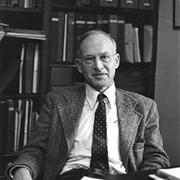
C. Conrad Wright, Professor of American Church History Emeritus at Harvard Divinity School, died peacefully at home in his sleep on February 17, 2011, at the age of 94.
Wright was a prominent scholar of American Unitarianism, and he had a significant relationship with and effect on HDS during his 33-year career.
Born on February 9, 1917, in Cambridge, Massachusetts, Wright was the son of C.H.C. Wright, a professor of French at Harvard, and his wife, Elizabeth Woodman Wright. He attended Browne and Nichols School, graduated from Harvard College in 1937, and went on to earn an MA in 1942 and a PhD in 1946 from Harvard. He was awarded an LHD from the Meadville Theological School in 1968 and from the Starr King School for the Ministry in 2004.
During World War II, Wright served in the 112th General Hospital of the United States Army. After the war, Wright taught for eight years at the Massachusetts Institute of Technology before coming to teach at Harvard in 1954. He retired formally in the fall of 1987, although in retirement he taught a course a year for the next two years. His career included a turn as the School's registrar and a major role in the education of HDS Unitarian students. When student demonstrations in 1969 disrupted Harvard, he served on a University-wide committee, chaired by Watergate prosecutor and Harvard Law School professor Archibald Cox, to find a way to calm the situation.
Wright was a member, regular attendee, occasional preacher, and clerk at First Parish in Cambridge (Unitarian Universalist), the congregation in which he had grown up. He later served as treasurer at the stately church, which dates back to the founding days of Harvard. Active in denominational affairs as well, he was a frequent consultant on matters of history and polity. In addition, Wright was president of the Unitarian Historical Society from 1962 until its 1968 merger with the Universalist Historical Society, and he was the longtime editor of its journal, the Proceedings of the Unitarian Universalist Historical Society.
Wright was John Bartlett Lecturer on New England Church History in addition to being Professor of Church History. He researched and wrote extensively on the history of Harvard and the Divinity School. He believed that the diversity and pluralism that the Divinity School enjoys today is in line with the openness of the School's founders.
"He was as committed to Unitarian Universalism as he was to the School and University," said David D. Hall, Bartlett Research Professor of New England Church History at HDS. "Generous and exacting at one and the same time, Conrad set the standard for writing about his tradition and its place in the broader religious and cultural history of our country. And when his career was feted in the early 1990s, former students fondly recalled his presence at their ordinations."
Wright's first work and magnum opus was The Beginnings of Unitarianism in America (1955). That volume received the Carnegie Award of the American Historical Association. He is the author of The Liberal Christians (1979), editor of Three Prophets of Religious Liberalism: Channing, Emerson, Parker (1986), and the co-author of A Stream of Light: A Sesquicentennial History of American Unitarianism (1975). He also wrote another monograph, Congregational Polity: A Historical Survey of Unitarian Universalist Practice (1997); two volumes of his collected essays The Unitarian Controversy: Essays in American Unitarian History (1994); Walking Together: Polity and Participation in Unitarian Universalist Churches (1989); and an edited volume of readings, Religion in American Life: Selected Readings (1972).
Wright was honored with the 1982 Katzenstein Award, which is granted by the HDS Alumni/ae Association. On his retirement in 1987, the School presented him with a hand-colored engraving of the 1836 Harvard bicentennial procession from the meetinghouse of First Parish to the Yard, a fitting recognition of his life-long devotion to these two institutions.
Wright is survived by his son Conrad Edick and daughter-in-law Mary of Medford, Massachusetts; son Nielson of Centreville, Virginia; daughter Elizabeth and son-in-law Jonathan Seiger of Silver Spring, Maryland; and six grandchildren. Professor Wright's wife, Elizabeth, died in 2005.
—by Jonathan Beasley
